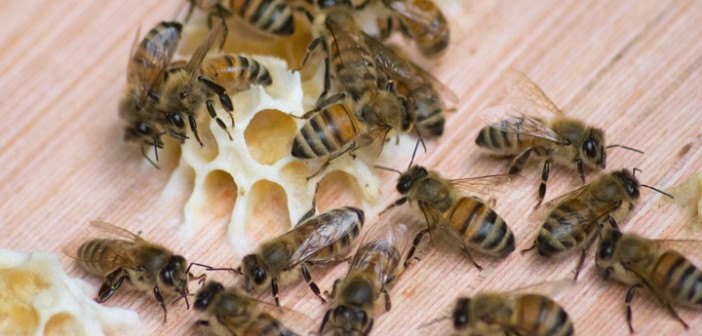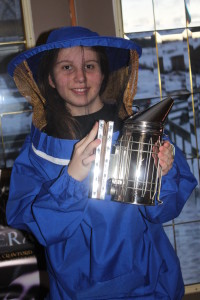On July 1st, 2015 the Ontario government will introduce new regulatory requirements targeted at reducing the number of acres of plants planted with neonicotinoid-treated corn and soybean seed by 80 percent by 2017. A growing body of scientific evidence shows that neonicotinoid insecticides are highly toxic to honeybees and other beneficial insects.
The catastrophic loss of honeybees over the past decade has motivated Jordan Winter to undertake a research effort focusing on the overwintering of honeybees in Northern Ontario.
“The death rate of honeybees has been steadily increasing over a few years which is the main area of concern,” remarked Winter.
Winter and her family acquired hives last fall and began inquiring after the most effective overwintering of honeybees techniques in the Algoma District. Having discovered that there wasn’t one tried and true best practice Winter set out to identify what practices would increase survivability of honeybees over the winter.
“The two things that end up killing the bees will be too low temperatures or high humidity. Here in Algoma, because of the Great Lakes, we have a micro-climate which is exactly that- extremely cold and extremely humid,” explained Winter.
Winter entered her research and preliminary findings in the Canada Wide Science Fair. The grade 10 Korah Collegiate student won the 4H Canada Award at the intermediate level and won a Bronze Award of Excellence at the intermediate level. That’s right- Winter is just 15 years old and conducting the first honeybee research specific to the Algoma District.
Winter early findings are provocative though she cautions that further research is required before she is prepared to formulate conclusions about her work just yet. However, a few tantalizing tidbits that she did share were that of the 70 hives surveyed in the Algoma District this winter a few successful overwintering practices included:
- Using a circular ventilation hole in the inner cover of the brood box
- Offsetting the brood box for boxes for ventilation
- The use of alpaca wool as insulation
- Not using multiple medications on a first year colony
- Not feeding over the winter
“The biggest finding was that of the 70 hives surveyed, half were fed and half were not fed. All of the hives that were fed over the winter did not survive. All the hives that were not fed did survive. A lot of people will feed out of necessity if the bees don’t have enough honey stores. And a lot of people will feed over winter because that’s what they’ve done forever,” remarked Winter.
Winter’s observation of survivability and apiarists feeding practices over the winter is a first for the Algoma District.

Dr. Pedro Antunes, Associate Professor, Algoma University. “For beekeepers in Northern Ontario the winters are harsh. The question ‘what is the best way to overwinter honeybees’ is a good one.”
Wanting to conduct scientifically sound research, Winter contacted Dr. Pedro Antunes, Associate Professor at Algoma University, and requested his direction.
“Jordan contacted me and I thought it sounded like a great project. And not only that, I thought that Jordan was very keen and bright. I am basically teaching her how to utilize the scientific method,” commented Dr. Antunes. “I’m having a lot of fun watching her go through the process. She’s quite amazing. She’s only in high school but I can treat her like a university student working on a masters or a Ph. D. She has a great capacity to listen, absorbs like a sponge and then delivers.”
Dr. Antunes added, “She’s passionate about what she is doing. She’s doing this because it’s important and that’s something worth mentioning.”
According to Dr. Antunes, because Winter has begun her work so early and having a long-term commitment to the research ensures more thorough and reliable findings. “After a few years Jordan could be an expert in this particular area,” he remarked.
Winter is hoping to generate funding to assist with her ongoing research. “I’d like to invest in data loggers where I could actually record internal hive temperature and humidity over a period of time so I could have more numeric data pertaining to different variables. There are a couple of other products like overwintering kits for bees and hive wraps that I’d like to invest in to give to apiarists around here so that I could try to record data using those variables.”
Winter would also like to expand participation in her study. “The ideal situation would be to survey every hive in Algoma. My ultimate end goal is to publish the study.”
*****
Survey: To participate in this much needed and worthwhile study, please fill out a survey by clicking here.
Or Email for a Hardcopy Survey: Jordan Winter at peacockjojo@gmail.com .
To view Jordan Winter’s preliminary findings you can click here.
To read more about Jordan and her work click here.




2 Comments
Makes sense. If you must feed, make sure it is way BEFORE winter, so the bees can evaporate and cap it before the temperatures reach dew point. Otherwise the hive will have excess moisture when the temperatures drop
Too many keepers take too much honey from the bees and then need to feed sugar back for winter stores.